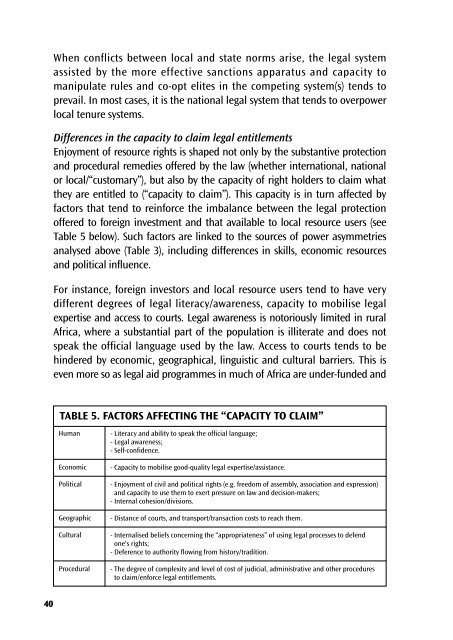Legal empowerment for local resource control
Legal empowerment for local resource control
Legal empowerment for local resource control
You also want an ePaper? Increase the reach of your titles
YUMPU automatically turns print PDFs into web optimized ePapers that Google loves.
40<br />
When conflicts between <strong>local</strong> and state norms arise, the legal system<br />
assisted by the more effective sanctions apparatus and capacity to<br />
manipulate rules and co-opt elites in the competing system(s) tends to<br />
prevail. In most cases, it is the national legal system that tends to overpower<br />
<strong>local</strong> tenure systems.<br />
Differences in the capacity to claim legal entitlements<br />
Enjoyment of <strong>resource</strong> rights is shaped not only by the substantive protection<br />
and procedural remedies offered by the law (whether international, national<br />
or <strong>local</strong>/“customary”), but also by the capacity of right holders to claim what<br />
they are entitled to (“capacity to claim”). This capacity is in turn affected by<br />
factors that tend to rein<strong>for</strong>ce the imbalance between the legal protection<br />
offered to <strong>for</strong>eign investment and that available to <strong>local</strong> <strong>resource</strong> users (see<br />
Table 5 below). Such factors are linked to the sources of power asymmetries<br />
analysed above (Table 3), including differences in skills, economic <strong>resource</strong>s<br />
and political influence.<br />
For instance, <strong>for</strong>eign investors and <strong>local</strong> <strong>resource</strong> users tend to have very<br />
different degrees of legal literacy/awareness, capacity to mobilise legal<br />
expertise and access to courts. <strong>Legal</strong> awareness is notoriously limited in rural<br />
Africa, where a substantial part of the population is illiterate and does not<br />
speak the official language used by the law. Access to courts tends to be<br />
hindered by economic, geographical, linguistic and cultural barriers. This is<br />
even more so as legal aid programmes in much of Africa are under-funded and<br />
TABLE 5. FACTORS AFFECTING THE “CAPACITY TO CLAIM”<br />
Human<br />
Economic<br />
Political<br />
Geographic<br />
Cultural<br />
Procedural<br />
- Literacy and ability to speak the official language;<br />
- <strong>Legal</strong> awareness;<br />
- Self-confidence.<br />
- Capacity to mobilise good-quality legal expertise/assistance.<br />
- Enjoyment of civil and political rights (e.g. freedom of assembly, association and expression)<br />
and capacity to use them to exert pressure on law and decision-makers;<br />
- Internal cohesion/divisions.<br />
- Distance of courts, and transport/transaction costs to reach them.<br />
- Internalised beliefs concerning the “appropriateness” of using legal processes to defend<br />
one's rights;<br />
- Deference to authority flowing from history/tradition.<br />
- The degree of complexity and level of cost of judicial, administrative and other procedures<br />
to claim/en<strong>for</strong>ce legal entitlements.

















